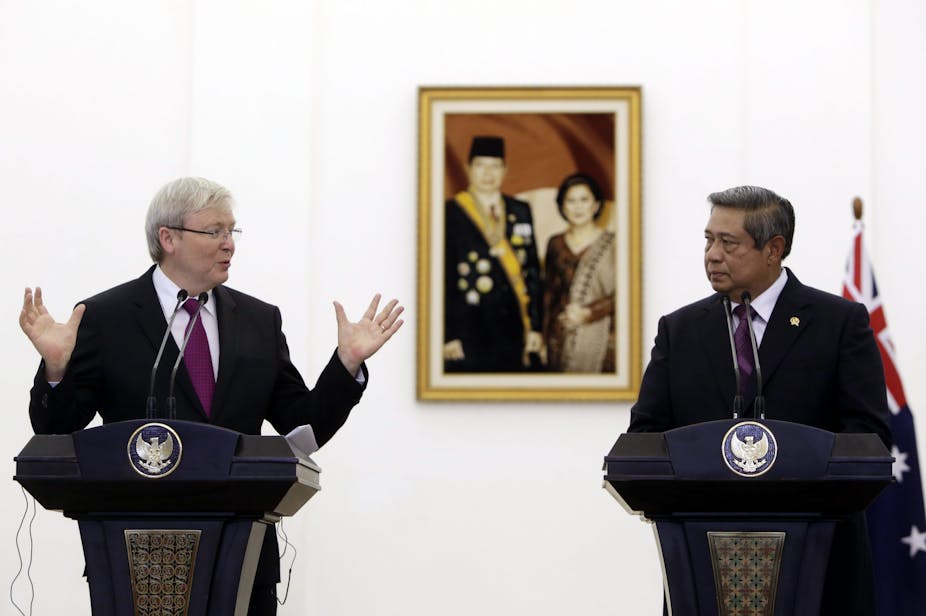Australian prime minister Kevin Rudd’s so-called “PNG solution” to the asylum seeker issue has attracted much comment from within both Australia and Papua New Guinea. It has also stirred the pot in Indonesia, but to a much lesser extent. It clearly isn’t the dominant Australia-linked issue playing out currently in Jakarta.
The consideration it has received has focused – not surprisingly – on how the strategy impacts on Indonesia’s interests.
For a former diplomat, Rudd has been remarkably clumsy in handling foreign affairs. In this case, he seems to have switched from support for a regional approach to the asylum seeker issue – in which he had strong support from Indonesia as recently as last month – to what many in Indonesia see as a unilateral approach, agreed with PNG. If the PNG strategy works, where would that leave the regional arrangement approach to which President Susilo Bambang Yudhoyono (SBY) has publicly attached his name?
There is also a worry that the strategy would potentially leave several thousand would-be asylum seekers in Indonesia with their preferred exit door closed. Given the painfully slow pace with which refugee determinations take place in Indonesia, they could be there for a long time – the last thing Indonesia wants.
And Australia’s megaphone call for Indonesia to deny Iranians visas-on-arrival didn’t make things easier either. The request was complied with, but government officials stressed that the action was taken because Iranians were involved in the drug trade as well as immigration violations, rather than because of Australia’s intervention.
It is these kinds of concerns which have produced the reportedly “cool” response from SBY to Rudd’s plan. There may well have been formal communication of the plan, but simply telling someone what you are going to do is not the same thing as genuinely consulting them, seeking their views and advice.
No doubt there was also some nodding of heads in Jakarta when Fijian Foreign Minister Ratu Inoke Kubuabola described the Australian policy as “inconsiderate, prescriptive, high-handed and arrogant”. Less welcome, though, would have been Kubuabola’s call to exclude the asylum seekers from the Pacific region on the grounds that they were Muslims whereas Melanesians were overwhelmingly Christian.
But overall, official reactions in Jakarta have been muted, at least in public.
However there have been two other stories featuring Australia which have featured in the Indonesian media, both of which have attracted more attention that the asylum-seeker issue – and made that issue even more complicated.
One is the allegation that British intelligence tapped the electronic communications of several Asian leaders, including SBY, at a G20 meeting in London in 2009: the story was originally reported in the Sydney Morning Herald. The suggestion is that the information gathered was passed on to Australia for use in its bid for a seat on the United Nations Security Council.
The Indonesian government has been publicly playing down these allegations, suggesting that their veracity needs to be checked.
But some individual Indonesian politicians have picked up the issue vigorously, calling on Australia to apologise for its actions. They argue that the incident shows – again – that Australia does not sufficiently respect Indonesia’s sovereignty and national significance.
One such politician is the Golkar Party’s Tantowi Yahya. Before entering parliament in 2009, he had made his reputation as a country and western singer, and television presenter fronting shows such as So You Want To Be A Millionaire? and Deal or No Deal: Indonesia. In Indonesian parlance, he was a “selebriti”, a profession which is an increasing source of national and regional politicians.
Of late, Tantowi has been the go-to Indonesian politician on the asylum seeker issue for many Australian journalists. Therefore, under the sub-heading “Indonesia slams Rudd”, the Sydney Morning Herald quoted Tantowi as saying about the PNG strategy:
The first thing that your country or the Prime Minister should contact is the minister of foreign affairs. And I’ve spoken with the minister a day after the announcement; he said he doesn’t know anything about it.
This sounds dramatic – and Tantowi would have felt flattered at being seen as speaking for the country as a whole. But Tantowi has been in the news for another reason: his recent visit to Israel.
Indonesia and Israel have no diplomatic relations. Members of the Indonesian parliament are not supposed to visit the “Israeli Zionist Colonialist State”, as more than one commentator has labelled it. And here’s the Australia connection: Tantowi has explained that his visit to Israel was at the invitation of the “Australian-Jewish Association”.
So: Australia has been spying on SBY, and has been seducing Indonesian politicians into visiting Israel. Against those two charges, it’s hardly surprising perhaps that Rudd’s PNG strategy for asylum seekers has attracted relatively little attention. Australia’s issues, we need to keep reminding ourselves, are not always Indonesia’s issues.

